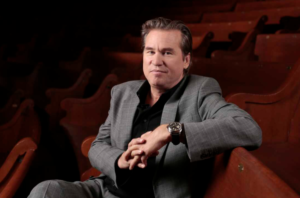Antigonón at the Kennedy Center
By Rachel Gallagher

Antigonón, un contingente épico—a Cuban take on the Greek tragedy Antigone—expresses the complex identity of Cuba both past and present, through bold artistic expression.
Antigonón, un contingente épico was performed at the Kennedy Center’s Eisenhower Theater March 21-22, 2017 by Teatro El Público, a Havana based theatre company founded by Carlos Díaz, who also acts as the director for this production of Antigonón. The production utilized its cast of five actors to express the struggles of Cuba throughout its history and to express the complicated relationship the characters have with their homeland, Cuba.
The tale of Antigone was first written by Sophocles. In the Sophoclean version, Antigone buries the body of her brother who has just lost the civil war of Thebes. Themes of fidelity to one’s family and to one’s country act as the crux upon which Antigonón, un contingente épico draws from the ancient Greek tragedy.
The script written by Rogelio Orizondo flowed with a passion and fire expressed by both the actors and the poetic writing itself. The nonlinear structure of the show, while complicated at times, worked to complement the chaotic nature of the production, rather than muddle it.
Nudity in theatre can be tricky, as often it becomes a gimmick and utilized only for the sake of being avant-garde, sans any clear meaning behind the nudity in the production itself. Antigonón manages to not fall victim to this trap, though, utilizing the characters’ bodies as a powerful metaphor for the sacrifices made for the Homeland—some less metaphorical than others. The command the performers had over their bare form made it clear when they were empowering themselves through their sexuality and when it was meant as an expression of unsexualized vulnerability, such as in one’s inherent vulnerability in wholehearted love, pride, and sacrifice for their country.
Despite a substantial amount of poignant nudity throughout the production, the costumes designed by Celia Ledón Acosta, at points stole the show, enhancing the production with the costumes’ sheer extravagance and absurdity. Acosta’s creations featured vibrant colors, beads, sky-high heels, and the final moments of the play saw a series of school uniforms worn as the production closed with questions posed by four of the cast members under the facade of school children being posed with questions which would typically be far beyond the comprehension of youthful naivety.
The true star of Antigonón was the intense and rapid pace of the production—for those of the audience who were not fluent in Spanish, like myself, it was overwhelming to keep up with the fast-paced dialogues and monologues by way of projected English subtitles throughout the nonstop hour and 20 minute show. The whirlwind of English subtitles, actor movement, and a projection of historical footage on the backdrop of the stage added to the intensity and passion with which Antigonón was performed.
The production of Antigonón by Teatro El Público expressively cries out both for and to Cuba. The tragedies of steadfast fidelity to family and homeland find a home in Díaz’s uniquely Cuban vision of Antigonón, un contingente épico.






